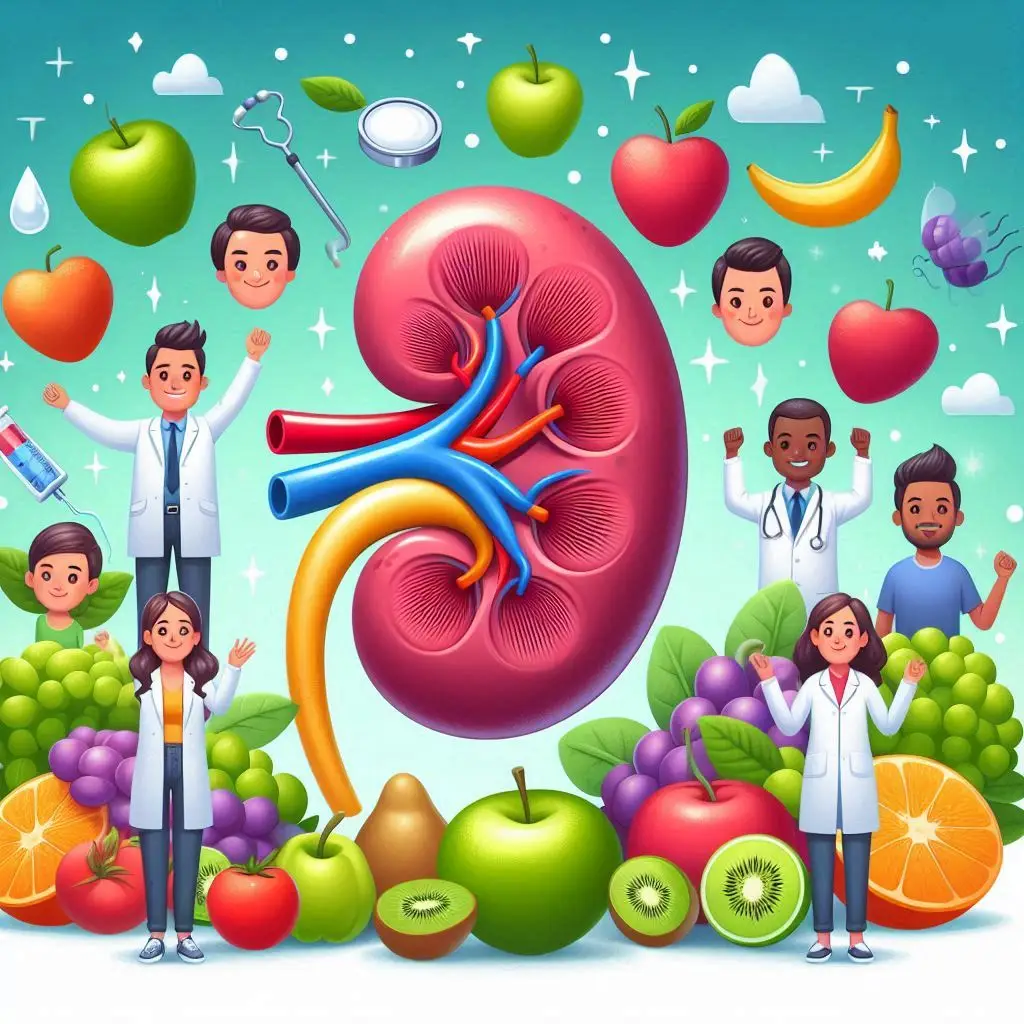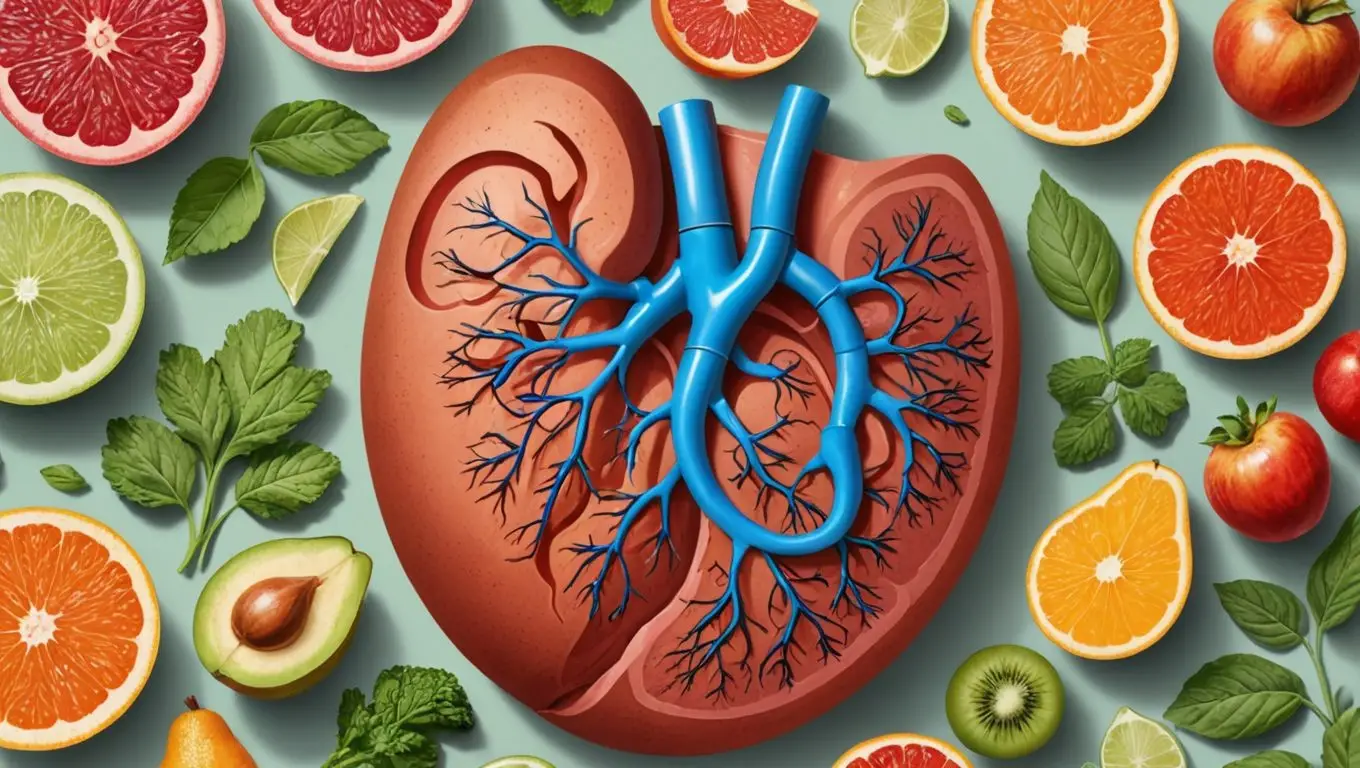Discover essential tips to boost kidney health and enhance longevity with our expert insights and practical advice.

Table of Contents

Introduction:
The kidneys, often overlooked but critical organs, play a pivotal role in maintaining overall well-being. These bean-shaped marvels are responsible for detoxifying the blood, balancing essential minerals, controlling blood pressure, and ensuring the body functions optimally. Yet, kidney health is frequently underestimated until problems arise. With the increasing prevalence of chronic kidney diseases worldwide, prioritizing kidney health is no longer optional—it’s a necessity.
This article unveils 15 inspiring secrets to ensure your kidneys remain healthy and functional. Each secret is designed to empower readers with actionable insights, debunk myths, and encourage positive lifestyle changes for a vibrant and healthy life.
Secrets to Kidney Health:
Stay Hydrated, Stay Healthy
Water is the lifeline of the kidneys. Proper hydration ensures that the kidneys efficiently filter toxins and produce urine, a primary function for waste elimination. Without adequate water intake, harmful substances can accumulate in the body, increasing the risk of kidney stones and infections.
- Role of Water in Kidney Function: Water assists in flushing out toxins, regulates electrolyte balance, and prevents dehydration, which can impair kidney efficiency.
- Tips for Proper Hydration:
- Drink 8-10 glasses of water daily, adjusting for activity levels and climate.
- Opt for herbal teas or infused water if plain water feels monotonous.
- Monitor the color of your urine—a pale yellow is often an indicator of good hydration.
Monitor Your Blood Pressure
High blood pressure is a silent but significant contributor to kidney damage. Hypertension can strain the tiny blood vessels in the kidneys, impairing their ability to filter blood effectively.
- Connection Between High Blood Pressure and Kidney Health: Persistent high blood pressure can lead to chronic kidney disease (CKD), a condition where kidneys gradually lose function.
- Practical Monitoring Tips:
- Invest in a home blood pressure monitor to keep track regularly.
- Adopt stress management techniques like yoga or mindfulness to naturally lower blood pressure.
- Follow a diet rich in fruits, vegetables, and low-fat dairy, known as the DASH diet.
Balanced Diet, Happy Kidneys
What you eat has a direct impact on your kidneys. A kidney-friendly diet not only ensures these organs function smoothly but also reduces the risk of kidney-related illnesses.
- Importance of Low-Sodium, Kidney-Friendly Diets: Sodium causes water retention, which increases blood pressure and adds extra strain on the kidneys. Reducing sodium intake is a key step toward kidney wellness.
- Foods to Include and Avoid:
- Include fresh fruits (like apples and berries), leafy greens, whole grains, and lean proteins.
- Avoid processed foods, canned soups, salted snacks, and preserved meats. Opt for natural seasonings like herbs and spices instead of salt.
Manage Blood Sugar Levels
Diabetes is a leading cause of kidney disease, making blood sugar management critical for kidney health. High blood sugar levels can damage the small blood vessels in the kidneys, impairing their ability to filter waste effectively.
- Link Between Diabetes and Kidney Disease: Diabetic nephropathy occurs when prolonged high blood sugar levels lead to kidney damage, increasing the risk of chronic kidney disease (CKD).
- Dietary and Lifestyle Adjustments:
- Focus on a balanced diet rich in whole grains, lean proteins, and non-starchy vegetables to regulate blood sugar.
- Incorporate regular exercise, like walking or yoga, to improve insulin sensitivity.
- Monitor blood sugar levels frequently and take prescribed medications consistently.
Quit Smoking for Kidney Longevity
Smoking has detrimental effects on kidney health by reducing blood flow to these organs and increasing the risk of high blood pressure, a major cause of kidney disease.
- How Smoking Damages Kidneys: The toxic chemicals in cigarettes impair kidney function and exacerbate existing conditions like diabetes and hypertension.
- Benefits of Quitting:
- Improved blood circulation to the kidneys.
- Lower risk of kidney disease progression.
- Enhanced overall health and reduced risk of cardiovascular diseases.

Exercise Your Way to Healthy Kidneys
Physical activity plays a crucial role in maintaining kidney health by improving circulation, reducing stress, and aiding in the management of risk factors like obesity and hypertension.
- Role of Physical Activity in Kidney Health: Exercise improves cardiovascular health, which directly supports kidney function by enhancing blood flow and reducing strain on the kidneys.
- Safe Exercises for Kidney Patients:
- Light activities like walking, swimming, or cycling.
- Yoga poses like “Child’s Pose” or “Bridge Pose” for gentle relaxation.
- Avoid high-intensity or strenuous activities without consulting a healthcare provider.
Detox Naturally
While kidney detoxification trends have grown in popularity, it’s essential to distinguish between myths and evidence-based practices. The kidneys are naturally efficient detoxifiers and don’t require special cleanses.
- Myths vs. Realities About Kidney Detoxification: Products claiming to “cleanse” the kidneys often lack scientific evidence and may even cause harm.
- Natural Ways to Promote Detox:
- Stay well-hydrated to flush out toxins.
- Include antioxidant-rich foods like cranberries and blueberries in your diet.
- Maintain a healthy weight to reduce stress on the kidneys.
Limit Over-the-Counter Pain Relievers
Non-Steroidal Anti-Inflammatory Drugs (NSAIDs) like ibuprofen and aspirin can harm the kidneys, especially when used long-term or in high doses.
- Harmful Effects of NSAIDs on Kidneys: Overuse of NSAIDs can decrease blood flow to the kidneys, leading to damage or kidney failure in severe cases.
- Safer Alternatives for Pain Management:
- Use acetaminophen-based pain relievers as a gentler option, under medical advice.
- Explore non-drug methods such as physical therapy or heat packs for pain relief.
- Always follow dosing recommendations and consult a doctor for chronic pain.
Protect Against Infections
Urinary tract infections (UTIs) and other infections can affect kidney health if left untreated, leading to complications such as pyelonephritis (kidney infection).
- Risks of Urinary Tract Infections: Infections can ascend from the bladder to the kidneys, causing inflammation and damage.
- Preventive Measures:
- Maintain good hydration to flush out bacteria.
- Practice proper hygiene to prevent bacterial entry into the urinary tract.
- Seek early treatment for UTIs to prevent kidney involvement.
Reduce Salt Intake
Excessive salt in the diet can be a silent saboteur for kidney health. High sodium intake forces the kidneys to work harder to remove the excess, leading to long-term strain and damage.
- How Excessive Sodium Affects the Kidneys: High salt levels contribute to water retention, elevated blood pressure, and an increased risk of kidney disease. Over time, this can impair kidney function and exacerbate conditions like chronic kidney disease (CKD).
- Low-Sodium Seasoning Alternatives:
- Use fresh herbs such as basil, parsley, or thyme to add flavor.
- Incorporate garlic, ginger, or lemon juice as natural flavor enhancers.
- Experiment with spice blends like paprika or turmeric for a sodium-free seasoning twist.

Get Regular Health Checkups
Routine kidney screenings can help catch potential issues early, ensuring timely intervention and better health outcomes.
- Importance of Routine Kidney Screening: Early detection of conditions like CKD, kidney stones, or hypertension can prevent severe complications. Regular checkups allow for monitoring of essential markers, such as creatinine levels and glomerular filtration rate (GFR).
- When and How to Consult a Nephrologist:
- If you experience symptoms like swelling, fatigue, or changes in urination, consult a healthcare provider promptly.
- For individuals at higher risk (e.g., those with diabetes, hypertension, or a family history of kidney disease), annual screenings are crucial.
Avoid Dehydrating Beverages
Sugary and caffeinated drinks may taste appealing, but they can dehydrate the body and strain the kidneys.
- Impact of Sugary and Caffeinated Drinks: Excess sugar can increase the risk of diabetes, while caffeine acts as a diuretic, causing increased urination and potential dehydration. Both factors can negatively impact kidney health over time.
- Healthier Beverage Options:
- Opt for water flavored with natural ingredients like cucumber or mint.
- Drink unsweetened herbal teas or coconut water for a refreshing and kidney-friendly alternative.
- Limit soda and energy drink consumption, especially those with high sugar content.
Support from Herbal Teas
Herbal teas can serve as a gentle, natural boost for kidney health, offering hydration along with specific benefits from plant-based compounds.
- Potential Kidney Benefits of Herbal Teas: Certain teas, such as nettle or dandelion tea, may promote kidney detoxification and support urinary tract health.
- Recommended Herbs for Kidney Support:
- Nettle Tea: Acts as a natural diuretic to aid in waste removal.
- Dandelion Tea: Supports liver and kidney function by enhancing filtration.
- Parsley Tea: Known for its potential to flush out excess sodium and improve urinary tract health.
Prioritize Sleep
Adequate sleep is more than a rest for the mind—it’s essential for the kidneys to recover and function optimally. Poor sleep patterns can exacerbate kidney-related issues, especially in people with preexisting conditions.
- Connection Between Sleep and Kidney Function: Sleep deprivation has been linked to reduced kidney function, as the kidneys depend on restful periods to regulate filtration processes and repair tissue.
- Tips for Better Sleep Hygiene:
- Establish a consistent sleep schedule by going to bed and waking up at the same time daily.
- Avoid screens and stimulants (like caffeine) at least 2 hours before bedtime.
- Create a serene sleep environment with dim lighting and a comfortable mattress.
Stay Informed, Stay Safe
Empowering yourself with accurate knowledge is one of the best ways to protect your kidney health and overall well-being.
- Importance of Kidney Health Awareness: Raising awareness about kidney health helps encourage preventive care and inspire healthier lifestyle changes in yourself and others.
- Reliable Resources to Learn More:
- Visit trusted medical platforms like the National Kidney Foundation (NKF) or World Kidney Day’s official website.
- Follow health blogs, podcasts, and webinars dedicated to kidney wellness.
- Consult your healthcare provider for personalized advice and resources.
Conclusion:
The kidneys are silent warriors that work tirelessly to maintain the body’s equilibrium. Throughout this article, we’ve explored 15 inspiring secrets to protect and enhance kidney health, emphasizing strategies like staying hydrated, maintaining balanced blood pressure, and adopting a kidney-friendly diet. From quitting harmful habits like smoking to embracing regular health checkups, these actionable steps can have a transformative impact on overall well-being.
As we wrap up, it’s essential to recognize that a proactive approach to kidney health is vital—not just for the kidneys themselves, but for the entire body. Making informed lifestyle choices, staying vigilant, and adopting preventative measures can go a long way in ensuring your kidneys continue to support a vibrant and healthy life.
Start small but stay consistent—whether it’s by drinking an extra glass of water daily, incorporating more kidney-friendly foods, or seeking regular screenings. The journey to kidney wellness is a lifelong commitment, and every step counts. Your kidneys deserve your care and attention—nurture them, and they will take care of you in return!
Read also: 7 Ways to Nurture Special Children With Love & Care
Share this content:

[…] “Bone Strength: 10 Powerful Ways to Boost & Energy!” […]
[…] II. Understanding Kidney Failure […]